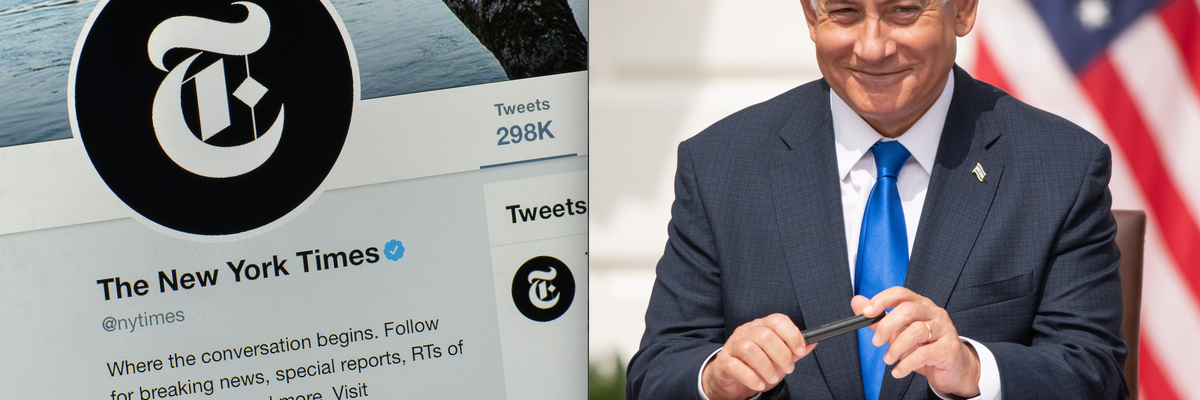The New York Times is worried that Israel’s feelings will get hurt if President Joe Biden re-enters the Iran nuclear deal.
That was the theme of a reported article that ran in Wednesday’s edition of the paper of record, pivoting off Secretary of State Antony Blinken’s recent visit to Jerusalem to meet with Israeli Prime Minister Benjamin Netanyahu.
According to the Times, “the prospect of a U.S. return to the nuclear deal threatens to generate new strains between Washington and Jerusalem on a subject that poisoned relations between President Barack Obama and Mr. Netanyahu.”
And? So what? What will the United States gain by re-entering the Iran deal? Will these supposed “new strains” with Israel have any impact on the JCPOA’s efficacy? Why is Joe Biden the guilty party here? Are the Israelis being unreasonable?
The Times did not explore any of these questions, and instead gave Bibi and his allies prime real estate to support Israel’s gripe and relay baseless criticisms of the nuclear accord without a hint of challenge.
The article began by quoting Netanyahu saying the JCPOA “paves the way for Iran to have an arsenal of nuclear weapons with international legitimacy.”
This assertion is just completely false. Not only does the agreement, via a variety of restrictions (some time limited) and a permanent inspection regime, ensure that Iran does not acquire nuclear weapons, but also, in the highly unlikely scenario that Iran somehow breaks that deal and develops a nuclear weapon, it certainly wouldn’t come with any “international legitimacy.”
“The way you know the JCPOA was a good deal is that its opponents have to invent non-existent problems with it,” arms control expert Jeffrey Lewis quipped, referring to Netanyau’s claim. The Times offered no such rebuttal.
Next, the Times turned to Foundation for Defense of Democracies’ Jonathan Schanzer, who was identified simply as “a Middle East expert,” to hype what he called an impending “political friction” between the United States and Israel.
Aside from whether this purported friction would actually amount to much with regard to U.S. national security interests, it’s unclear on what criteria the Times used to award Schanzer with an “expert” title. Of course, the Times failed to mention that one of his primary roles at FDD is to harass and smear college students who support rights for Palestinians. Moreover, just last week, the Times identified FDD as “a Washington group that supports Mr. Netanyahu’s policies” — a context that would seem relevant to this article as well. Apparently, this week, however, FDD became a neutral arbiter with objective expertise, not the fanatical group hellbent on regime change and war with Iran that it is.
The piece then relayed attacks on the JCPOA from 44 Senate Republicans who claim the Iran deal will do nothing but “enrich Israel’s enemies.” Carnegie’s Karim Sadjadpour picked up on that baseless theme by setting up the Iran nuclear deal as a means for the United States to fund Iran’s proxies and regional military activities.
And of course, no anti-JCPOA screed would be complete without someone calling the deal “appeasement,” which the Times graciously provided Israel’s former ambassador to the United States, Ron Dermer, the opportunity to do.
The Washington Institute for Near East Policy’s David Makovsky — who himself has floated the idea of going to war with Iran over its nuclear program — wrapped things up by passing on skepticism from Israeli officials about the utility of any U.S. diplomacy with Iran should both sides reach an agreement to resume full compliance with the JCPOA.
The Times quoted no one to counter any of this nonsense or to offer points about the JCPOA’s clear benefits (that were working just fine before Donald Trump withdrew from the deal and reimposed sanctions). Nowhere in the article does the Times mention what the Iran deal actually does. It offered none of the nuances of sanctions relief. Nor did it explore the role that diplomacy will play in future negotiations with Iran about issues outside the nuclear file.
Sadly, this kind of coverage of Iran and the JCPOA is par for the course for the Times. Perhaps the paper can complete the circle here and have its columnist Bret Stephens pen a piece this week trashing the deal without disclosing his side gig at a pro-Israel advocacy organization.

















